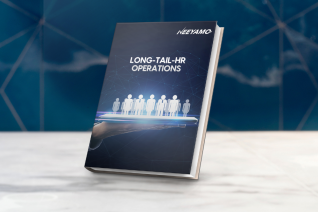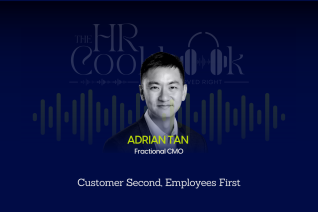Establish your presence globally with Neeyamo as we help you go beyond borders to manage your international payroll and hire new talent in Argentina.
Overview
Do you ever wonder where a country got its name from? Argentinas, though not that obvious, instantly clicks when you see it. Argentina's name is derived from 'Argentum', the Latin word for silver. When a Spanish colony discovered a massive amount of silver in the country during the 16th century, they named it so. The name stuck even after the country gained independence, and Argentina went on to be one of the biggest producers and exporters of silver in the world. Argentina is also home to various other precious resources, such as its dedicated workforce.
Do your organization’s expansion plans require you to hire employees in Argentina? Do you lack a physical entity in the country – a key requisite to hire local talent? Neeyamo – one of the top Global payroll providers, assists organizations worldwide with onboarding and managing employees in Argentina - processing payroll, managing local compliance requirements, benefits, and more.
Our Presence
Tools And Instances
Facts And Stats
Capital
Buenos Aires
Currency
Argentine Peso (ARS)
Official Language
Spanish
Fiscal Year
1 January - 31 December
Date Format
DD/MM/YYYY
Country Calling Code
+54
Other Languages
Arabic, Italian, German, English, and French
Time Zone
UTC-3:00
Global Payroll
Overview
Payroll: Meaning
Payroll means the list of compensation to be paid to employees of a company or organization for a set period or date. Global payroll companies allow organizations to outsource their payroll, allowing employers to focus on other aspects of their business.
What is Global Payroll?
Handling payroll for a widespread workforce can pose a significant challenge for any organization, and the added complication of compliance can make things worse. If companies spend more time processing payroll, it directly impacts day-to-day operations and their overall productivity. The solution to this is global payroll outsourcing. Global payroll processing is typically done with the assistance of an outsourced payroll provider.
What is a global payroll system?
Over the years, global payroll companies such as Neeyamo, have observed these complexities and strived to provide global payroll solutions through a single technology platform – Neeyamo Payroll. Neeyamos global payroll systems ease the process for companies looking to outsource their global payroll requirements and aid them in maneuvering the tricky payroll system in Rwanda. Neeyamo's payroll software provides the perfect solution for all your global payroll needs – for employees working in primary geographies, the long-tail region, remote or internationally located.
How is payroll calculated?
Neeyamo acts as your personalized Payroll Calculator. Ensuring adherence to local regulatory requirements using multi-level controls. Providing timely and accurate payroll, courtesy of our experts worldwide and using a tech-based integrated smart helpdesk solution with seamless support experience manned by payroll experts - Neeyamo has all your payroll needs covered.
Payroll Taxes
Payroll tax is the percentage amount retained from an employee's salary and paid to the government to invest in the general population's welfare. These are statutory in nature and are levied from both the employer and employee. Additional statutory contributions are made by employers towards aiding both short-term and long-term benefits for their employees.
Employee Taxes
Pension Fund, Family Allowance Fund, and Social Services - 14%
Social health - 3%
Total social tax - 17%
| Up to 173,834.61 ARS | 0% |
| 173,834.61 - 347,669.23 ARS | 9% |
| 347,669.23 - 521,503.84 ARS | 12% |
| 521,503.84 - 695,338.47 ARS | 15% |
| 695,338.47 - 1,043,007.68 ARS | 19% |
| 1,043,007.68 - 1,390,676.90 ARS | 23% |
| 1,390,676.90 - 2,086,015.35 ARS | 27% |
| 2,086,015.35 - 2,781,353.85 ARS | 31% |
| 2,781,353.85 ARS and above | 35% |
Effective from May 11, 2023, the maximum monthly tax-exempt amount is 506,230 Argentine pesos and the maximum additional deductible amount on income exceeding 506,230 pesos is 583,851 pesos.
Effective June 16, 2023, the maximum monthly tax-exempt amount for the 2023 complementary annual salary is 880,000 Argentine pesos and it was established that the additional settlement provision for the calculation and reimbursement of the excess withheld amount will be in two monthly, equal, and consecutive installments during June and July.
Employer Taxes
Pension Fund, Family Allowance Fund and Social Services - 20.4%
Social health - 6%
Total social tax - 26.4%
Payroll Cycle
Overview
Undoubtedly, payroll is a critical process for any organization. The pay cycle in Argentina refers to the period for which an organization pays its employees, and this can vary depending on the pay frequency that the organization chooses to adopt.
Frequency
Typically, employees are paid monthly within four days of the following month. For hourly employees, wages are paid either weekly or every two weeks.
13th Month Cycle
The 13th salary is payable in two installments, one before June 30 and the other before December 18.
Global Work
Overview
What is Employer of Record?
An Employer of Record services / EOR services provider helps you eliminate the hassle of handling complexities while onboarding a new employee in an international location. They help bridge the gap that otherwise mandates organizations to have a local registered entity and a local bank account, prior to making a job offer to an international hire.
An Employer of Record services / EOR services provider acts as a legal employer, facilitates salary payments, and manages other statutory requirements such as health insurance, payroll taxes, and employee benefits, ensuring compliance with local tax laws and regulations.
This allows organizations to focus on collaborating with the employee in Argentina for operational tasks, with the knowledge that they have a cost-effective solution to support their global payroll management & HR requirements as they continue their global expansion.
HR Mandates and Practices
Minimum Wage
On October 1, 2023, the monthly minimum wage increased to 132,000 Argentine pesos, up from 118,000 Argentine pesos. The monthly minimum wage will increase to 146,000 Argentine pesos on November 1, 2023, and 156,000 Argentine pesos on December 1, 2023.
Overtime
Overtime hours should not exceed 3 hours per day, 30 hours per month, or 200 hours per year. Employees also receive an additional 50% for overtime and 100% for holidays or work performed after 1 PM on Saturdays.
If the work is performed between 21:00 and 06:00, the working day must not exceed seven hours, and employees who work shorter night shifts must be given the same salary as employees who work long day shifts.
Data Retention Policy
Tax records must generally be kept for a minimum of five years. Social security records should be kept for five years. All records regarding compensation and benefits must be kept for a minimum of five years.
Hiring and Onboarding Requirements
Hiring
- It is prohibited to discriminate against employees based on sex, race, nationality, religion, marital status, political or trade union ideas, age, sexual orientation, disability, or physical appearance.
- Arbitrary discrimination, where employers make distinctions on unreasonable grounds, is prohibited. However, employers are allowed to make distinctions as long as they are based on objective criteria, such as productivity. As an integration tool, the Ministry of Labour and Social Security (MTEySS) has developed special programs and provided fiscal benefits and free advice for potential employers interested in hiring disabled employees for its staff.
- In addition, the only mandated preferences in hiring are established for the public sector under the quota system. It is mandatory for public agencies, state companies, and public enterprises that carry out public services for a minimum of 4 percent of their total personnel to be employees with a disability and 1 percent to be trans-persons over the total of their personnel.
Onboarding
If you are already a resident of Argentina or studied in your country of origin or current residence, a criminal record and validation of qualifications may be requested.
Along with this, the following documents, as well
- CUIL (copy),
- Last Form 1357 (Income tax), if applicable for the last fiscal year,
- (if applicable) Other employer's contract/payslip information in case of multiple employees,
- Social Health insurance option/join company,
- (if applicable, in charge of employee) to fill and declare in the AFIP Form. 572 (Personal Deductions for Income tax)
Probation
According to labor law, the first three months of a contract of employment are considered a probation period. During this period, either party may terminate the agreement at any time if it has been duly registered with the competent authority in charge of labor.
Leave
Public Holidays
There are 20 national holidays.
- January 1: New Year
- February 20: Carnival / Shrove Monday
- February 21: Carnival / Shrove Tuesday / Pancake Day
- March 24: National Day of Memory for Truth and Justice
- April 2: Veteran's Day and the Fallen in the Malvinas War
- April 6: Maundy Thursday
- April 7: Good Friday
- May 1: Labor Day
- May 25: May Revolution Day
- May 26: Bridge Public Holiday
- June 17: Commemoration of General Don Martín Miguel de Güemes
- June 19: Bridge Public Holiday
- June 20: Passage to Immortality of General Don Manuel Belgrano.
- July 9: Independence Day
- August 21: San Martín Day
- October 13: Bridge Public Holiday
- October 16: Day of Respect for Cultural Diversity
- November 20: National Sovereignty Day
- December 8: Feast of the Immaculate Conception
- December 25: Christmas
Annual Leave
Employees have a minimum period of paid annual vacations depending on seniority. They are:
- 14 calendar days for employment for less than five years.
- 21 calendar days for employment between five and ten years.
- 28 calendar days for employment between 10 and 20 years
- 35 calendar days for employment for more than 20 years
The length of the vacation that an employee is entitled to based on seniority is the one that the employee would have as of 31st December of the year to which it corresponds.
An employee is required to work at least half of the working days of the calendar year to earn their full annual leave entitlement. For this purpose, the holidays on which the employees should normally provide services will be counted as business days.
The holiday shall begin on Monday or the next business day if that is a holiday. In the case of employees who work on non-working days, annual vacation shall begin on the following day or the subsequent business day if that is a holiday. For this purpose, an employee does not require minimum seniority.
The employer shall have the right to set vacation dates and must notify the employee twenty (20) days in advance. Vacation will be granted between November 1 and March 30 of each year. It may be divided at the request of the employee or to be enjoyed at other times of the year, as long as a continuous period of leave of not less than two is guaranteed. Thirds (2/3) of the one that corresponds to him according to his seniority.
Sick Leave
Paid leave due to an illness or an accident:
- Employees with less than five years of service – 3 months
- Employees with five or more services or with dependents – 6 months
- Employees with five or more years of service and with dependents – 12 months
Employees who are unable to return to work after their leave expires for physical or mental reasons are entitled to an additional 12 months of unpaid leave. During this time, their employers must keep the employee’s job position open. The employer can terminate if the employee doesn’t return subsequently. The employer may terminate the employment without severance.
Maternity Leave
Employees are entitled to 45 days of unpaid leave to their expected childbirth and 45 days after. The employee may choose to reduce this pre-delivery leave, which in such case shall not be less than 30 days, and to add to the postpartum leave. In case of early delivery, the amount of prenatal leave not taken is added to postnatal leave, in order to complete the 90 days. The employee must provide a medical certificate with an expected date of childbirth.
Pay – The employee is not entitled to be paid by the employer but receives a social security benefit from the Social Security system equivalent to normal remuneration. Upon expiry of the maternity leave, the employee can decide whether to:
- Return to work under the same conditions in which they have been previously working.
- Take up to a minimum of 3 months leave and a maximum of 6 months additional unpaid maternity leave, in which case employers must reinstate employees once the leave expires. This is applicable to employees who have been with the employer for at least one year.
- Resign and obtain a special farewell bonus equivalent to 25% of the mandatory severance pay, which may not exceed a minimum living wage per year of service or a fraction greater than three months. This is applicable to employees who have been with the employer for at least one year.
Paternity Leave
Men are entitled to 2 days of paid leave for the birth of a child.
Other Paid Leaves
Employees can take paid leave for the following circumstances:
- Marriage: 10 calendar days;
- Birth of Child: 2 days
- Death of a spouse, child, or parent: 3 days;
- Death of a sibling: 1-day ;
- High school or college exam: two days (maximum ten days per year) – The employee must prove to the employer that they have taken the exam by presenting the certificate issued by the institute in which they study.
- Foreign Nationals who come from a bordering country are entitled to up to 4 days’ leave.
Such leaves shall be paid, and the salary shall be calculated in the same manner as vacation pay is calculated, which states that in case of paid work with a monthly salary, dividing by twenty-five (25) the amount of the salary received at the time of its granting.
In case of paid leave granted for the birth of a child, the death of a sibling, and the death of a child, spouse, or parent, a business day must necessarily be computed, when it coincides with Sundays, holidays, or non-working days.
Public Duty Leave: An employee who is called to give testimony before the court is entitled to paid leave. Those who are elected to sit on a representative body are entitled to leave without payment. The period of leave is considered working time for seniority purposes.
Military Leave: An employee who has to render compulsory military service shall be provided paid leave from the date of convocation and up to 30 days after the service has been concluded. Employers can, however, claim reimbursement from the government authorities.
Termination
Notice Period
Prior notice periods have been established by law as follows:
- 15 days' notice when the employee is in a trial period;
- one month's notice when the employee has worked for less than five years; and
- two months' notice when the employee has seniority that exceeds five years.
If the employer prefers not to give the prior notice, it must pay an amount equal to the corresponding period of prior notice.
Severance Pay
The severance pay is different for voluntary and involuntary termination-
Termination based on the worker's conduct: No severance pay is due.
Termination based on economic grounds: An employer must give advance notice of the termination and make a severance payment, roughly equal to half a month's salary for each year of service.
Termination without just cause or without any cause at all: The amount of severance pay and compensation in lieu of notice is paid at twice the base rate (i.e., a 50% increase) if the employer fails to register the employment relationship.
Visa
Overview
Most employees planning to work in Argentina longer than 90 days will need a 23 A or 23 E visa. The 23 A visa applies to most people moving to Argentina for a salaried activity that lasts one year. If needed, employees can extend this visa for longer. The 23 E visa is specific to scientists, specialists, some managers, technicians, and administrative staff. Employees who fall into any of these categories may need to apply for a 23 E visa.
Certain ex-pats from South American countries, such as Brazil, Paraguay, and Uruguay, do not need to acquire any of the above visas. Citizens from MERCOSUR — the South American customs union — should go to their closest Argentine mission and ask about the MERCOSUR visa.
Requirements for Visa
The work visa requirements in terms of long-term employment must have the following important documents:
- Education certificates
- The employment contract with the Argentinian employer's signature validation and the company's registration number.
Applications are personal, and the applicant must submit the following documents (an original and a copy) at the Consular Office:
- Passport valid for at least six (6) months at the time of entering Argentina, with at least two (2) blank pages.
- Two (2) current 4 x 4 cm photographs facing the camera, printed in color on a white background
- Visa application form filled out (preferably in electronic format) and signed by the applicant
- Proof of address within the jurisdiction of the Consulate (such as a utility bill or other document that serves as proof).
- An apostilled or legalized certificate of good conduct issued by the competent authority of the countries where they resided for more than one year over the previous three years
- Commitment to tell the truth or Sworn affidavit of their lack of a criminal record in other countries, signed before the Consul.
- Employment contract signed by the employer and including the registration number of the contracting company with the National Registry of Petitioners on behalf of Foreign Applicants (RENURE). The signature of the company's representative must be certified by an Argentine Notary Public and the relevant Association of Notaries Public. The visa applicant must sign the contract before the Consul. If the host is not registered with RENURE, please call (54-11) 4317-0200/0303/0337 to complete the registration.
- Payment of migration fee
- Payment of consular fee: 250 US dollars or euros, depending on the Consular Office where the application is filed. The fee must be paid in the local currency of the Consular Office
- Consular interview
Employee Background Checks
Legal and Background Checks
An employer cannot perform a direct background verification of an employee since the employee's record is provided. The Criminal Records Registry is treated as privileged information that can only be accessed by the concerned person or their legal representative if they display a valid reason for the criminal certification. However, employers must be careful not to discriminate against certain candidates.
There are no specific legal restrictions on checks an employer may carry out on job applicants. The employer has the right to check the personal, educational, and criminal references of recruits if the dignity and privacy of the candidate are not affected; the employer should obtain the individual's consent to minimize interference with their privacy. Social media accounts are considered private and cannot be checked by prospective employers except with the permission of the candidate, who is taking steps to preserve their privacy. The employer does not have to obtain consent for general background checks and checks on health status, except for HIV tests.
Last updated on September 19, 2023
If you have any queries or suggestions, reach out to us at irene.jones@neeyamo.com








